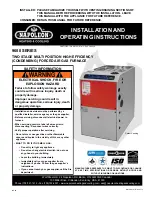
2.1 GENERAL SAFETY RULES
H25.1
1. Combustible materials should not be stored against or around the furnace. Keep the furnace area clear
and free from all combustible materials such as newspapers, rags, cardboard, foam, plastic, paper backed
fi berglass insulation, clothing, etc. This applies especially to gasoline and other fl ammable vapors and
liquids.
2. This furnace is CSA certifi ed as a Category IV indirect or direct vent appliance. It is designed to operate
as a single pipe (inside combustion air) or two pipe (outdoor combustion air) system. A furnace needs
adequate amounts of combustion air to operate properly. Do not block or obstruct the air-intake terminal on
the furnace, or air openings supplying combustion air to the area where the furnace is installed, if operating
as a single pipe system. There are many areas from which your furnace could be receiving combustion
air including from within the heated area (inside air), from outdoors, from an attic or crawl space. If
renovations are done, be sure that air supply openings are not inadvertently covered over with insulation,
vapor barrier, or similar construction material.
3. All doors and panels must be in place during normal furnace operation. Attempting to operate the furnace
with missing doors or panels could lead to the creation of carbon monoxide gas.
4. If the furnace is installed in a confi ned space or if you intend to build a furnace room where insulation
is present, be aware that some insulating materials are combustible. Do not allow building insulating
materials to come into contact with the furnace.
5. Any additions, alterations or conversions required in order for the furnace to properly match the application
requirements must be done by a qualifi ed installation contractor, service agency or gas supplier, using
factory specifi ed or approved parts.
6. Familiarize yourself with the location of the furnace gas manual shut-off valve and any electrical switch,
fuse or circuit breaker associated with the furnace.
7. Do not allow snow, ice or debris to accumulate around the outdoor furnace exhaust and combustion
air intake terminals. Blockage of the exhaust or combustion intake terminals can result in inadequate
performance or nuisance shut-downs.
8. Familiarize yourself with the location of your furnace fi lter or fi lters. A blocked air fi lter will reduce effi ciency,
increase fuel consumption, raise the furnace operating temperature, and shorten the life of furnace
components.
9. Do not cover return air grills and supply air registers with drapes, curtains, throw rugs, etc.
10. Avoid shutting off supply air registers in the interests of saving heat. While there is some validity to this
practice with space heating, there is little to be gained in central heating systems. The furnace requires
a quantity of air passing over the heat exchanger to operate within design temperatures. Reducing the
number of supply air registers available for air delivery may have the unforeseen consequence of raising
the furnace operating temperature, reducing furnace effi ciency, and shortening the life of the furnace
components.
W415-1245 / B / 03.19.15
UM
65
Summary of Contents for Continental C95 - B SERIES
Page 27: ...W415 1245 B 03 19 15 27 IOM FIGURE 14A DIRECT VENT TERMINAL CLEARANCES...
Page 28: ...W415 1245 B 03 19 15 28 IOM IOM FIGURE 14B NON DIRECT VENT TERMINAL CLEARANCES...
Page 58: ...W415 1245 B 03 19 15 58 IOM IOM 23 0 SERVICE HISTORY 43 1...
Page 74: ...6 0 NOTES 44 1 W415 1245 B 03 19 15 UM 74...












































